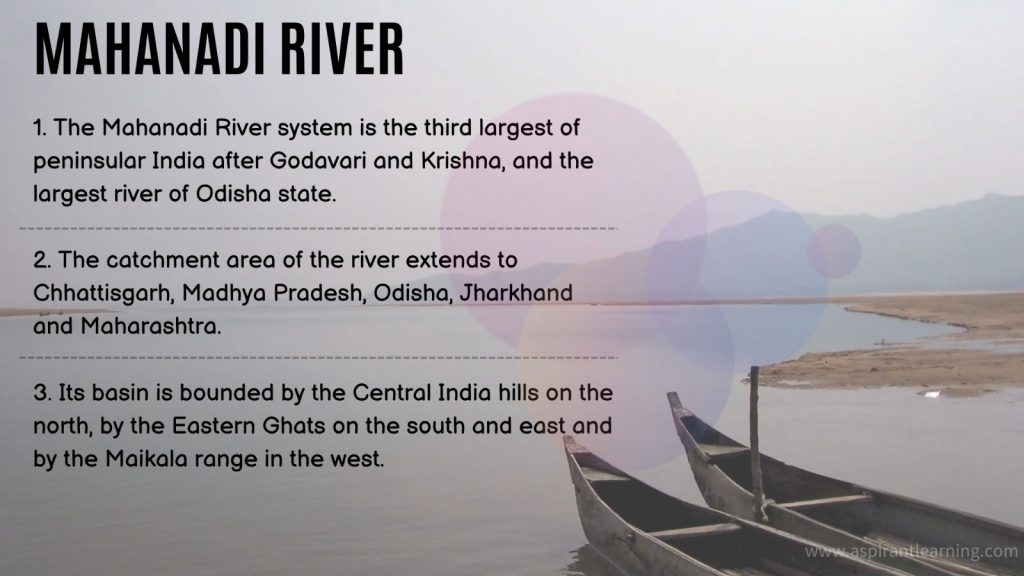News Highlights:
A massive controversy erupted in Odisha over Chhattisgarh’s release of Mahanadi water into the lower catchment of the river system.
Key takeaway:
- Odisha has complained to the Ministry of Jal Shakti under the Inter-State River Water Disputes (ISRWD) Act 1956, accusing Chhattisgarh of misleading the Mahanadi Water Disputes Tribunal (MWDT) by releasing water in the Mahanadi River in the Non-Monsoon Season.
- The MWDT was formed in March 2018. The tribunal has been asked to submit its report by December 2025 to the Ministry of Jal Shakti.
- Odisha and Chhattisgarh have no inter-state agreement regarding Mahanadi basin water allocation.
Details of the Dispute:
- Allegation on Chhattisgarh:
- As per the allegation of the Water Resource Department of Odisha, Chhattisgarh has opened 20 gates at Kalma Barrage, through which 1,000-1,500 cusecs of water flow into Mahanadi’s low catchment area during the non-monsoon season.
- The officials of the department claim that gates were opened ahead of the scheduled visit of the former Supreme Court Justice A.M. Khanwilkar, the Chairperson of the Mahanadi Water Disputes Tribunal.
- The concern of Odisha:
- Odisha has expressed concerns over Chhattisgarh’s management of Mahanadi river water in the upper catchment area as Chhattisgarh, in recent times, has constructed several barrages restricting the flow of water in Odisha, which is a lower catchment area.
- The non-availability of water in the Mahanadi River during the non-monsoon season has adversely impacted rabi crops and reduced drinking water availability in Odisha.
Mahanadi Water Disputes Tribunal:
- Overview:
- In 2018, the Supreme Court directed the Centre to notify a Tribunal to adjudicate the dispute.
- The Mahandi Water Disputes Tribunal was constituted in March 2018 as Odisha filed a complaint with the Ministry of Jal Shakti under Section 3 of the lnter-State River Water Disputes (ISRWD) Act, 1956.
- Water sharing Clause:
- It has been asked to determine water sharing among basin states on the basis of
- the overall availability of water
- contribution of each state,
- the present utilisation of water resources in each state and
- the potential for future development”.
- The tribunal has been tasked to submit its report by December 2025.

Inter-State River Disputes in India:
- Overview:
- The Inter-State River Water Disputes are among the most contentious issues in Indian federalism today.
- The recent cases of the Krishna Water Dispute, the Cauvery Water Dispute and the Satluj Yamuna Link Canal are some examples.
- Various Inter-State Water Disputes Tribunals have been constituted but have had problems.
- Constitutional Provisions:
- Water is on the State List. Entry 17 of the State List deals with water, i.e., water supply, irrigation, canal, drainage, dams, water storage and hydropower.
- Entry 56 of the Union List empowers the Union Government to regulate and develop inter-state rivers and river valleys to the extent Parliament declared expedient in the public interest.
- According to Article 262, in case of disputes relating to waters: Parliament may by law provide for the adjudication of any dispute or complaint concerning the use, distribution or control of the waters of, or in, any inter-State River or river valley.
- Parliament may, by law, provide that neither the Supreme Court nor any other court shall exercise jurisdiction regarding any such dispute or complaint as mentioned above.
The Mechanism for Inter-State River Water Disputes Resolution:
- River Board Act, 1956:
- As per Article 262, the Parliament has enacted River Board Act which empowered the GoI to establish Boards for Interstate Rivers and river valleys in consultation with State Governments.
- To date, no river board has been created.
- Inter-State Water Dispute Act, 1956:
- As per Article 262, the Parliament has enacted Inter-State Water Dispute Act.
- In case a particular state approaches the Centre for the constitution of the tribunal, the Central Government should try to resolve the matter by consultation among the aggrieved states. In case it does not work, then it may constitute the tribunal.
- Note: Supreme Court shall not question the Award or formula given by the tribunal, but it can question the working of the tribunal.
- The Inter-State Water Dispute Act 1956 was amended in 2002 to include the major recommendations of the Sarkaria Commission.
- The amendments mandated a one-year time frame to set up the water disputes tribunal and also a 3-year time frame to give a decision.
Pic Courtesy: Freepik
Content Source: The Hindu



